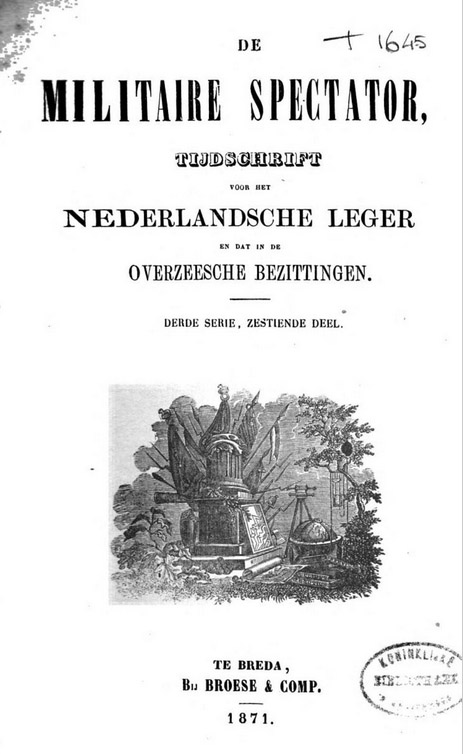The British, French, and Prussians sent observers to America to study the American Civil War - they were focused mainly on technology and tactics. The war was soon overshadowed in European minds by the wars of 1866 and 1870. In general the Dutch paid even less attention to the American Civil War, but in 1871 a "Lt. Jacques Arnould Obreen" wrote an over 600 page book on the war, "De Noord-Amerikaansche oorlog van 1861-1865", a book that came to some conclusions he believed were useful to the Dutch. Being a relatively small country, the Dutch had to decide what sort of army it should use to defend itself. Obreen argued in favor of a militia army, a relatively inexpensive option. Daniel Meijers, a Dutch Civil War enthusiast who brought this book to my attention has this to say,
"Half the book is a general history military events during the war. A
quarter was about technology and engineering of which lessons the Dutch
military could learn, the rest was a description of the army of the
Union with some commentary and analysis. It should be noted that there
is less analysis on battles and tactics than on organization and
fortifications. This is because the writer himself didn't find it very
important, and I guess he served in the cavalry which is why he pays
more detail to that. Also I guess that he wrote about the things that, Dutch military mainly was interested in. By
1871 the Netherlands maintained an official policy of neutrality. Its
armed forces were mainly geared for maintaining that neutrality. When an
enemy army invaded, it would try to delay the enemy as much as
possible, in order to give time to 'inundation' ( setting large swaths
of land under water) followed by a withdrawal behind its fortress line.
An ally against the enemy would be sought out and together they would
drive out the enemy out of the country. So lots of emphasis goes to
fortifications and amphibious assaults because the navy was expected
to defend the many water inlets and because a lot of those kind of
operations were conducted in Indonesia. But in general, there was no
real interest in the Civil War, and what most officers knew came from
German or French military magazines. Lieutenant
Obreen only made a study out of the Civil War because his first
subject, the Schleswig-Holstein War, was already taken. He put a lot of
his own money into it and it is mainly based on English, French, and some
American sources, but even he admits there was no interest for such a
study."
Obreen became so fascinated with America that he immigrated to California and worked himself to death in pursuit of the American dream.
In Volume 38 of "de Militaire Spectator, "Captain A. Pompe" reviewed Obreens' book, concluding that a well funded professional army is a better option and that Union victory would have come much sooner if the United States had spent more money on a larger pre-war army.
Many thanks to Daniel Meijers for providing a translated version of the book review, of Obreen's response, and a portion of Obreen's book.

